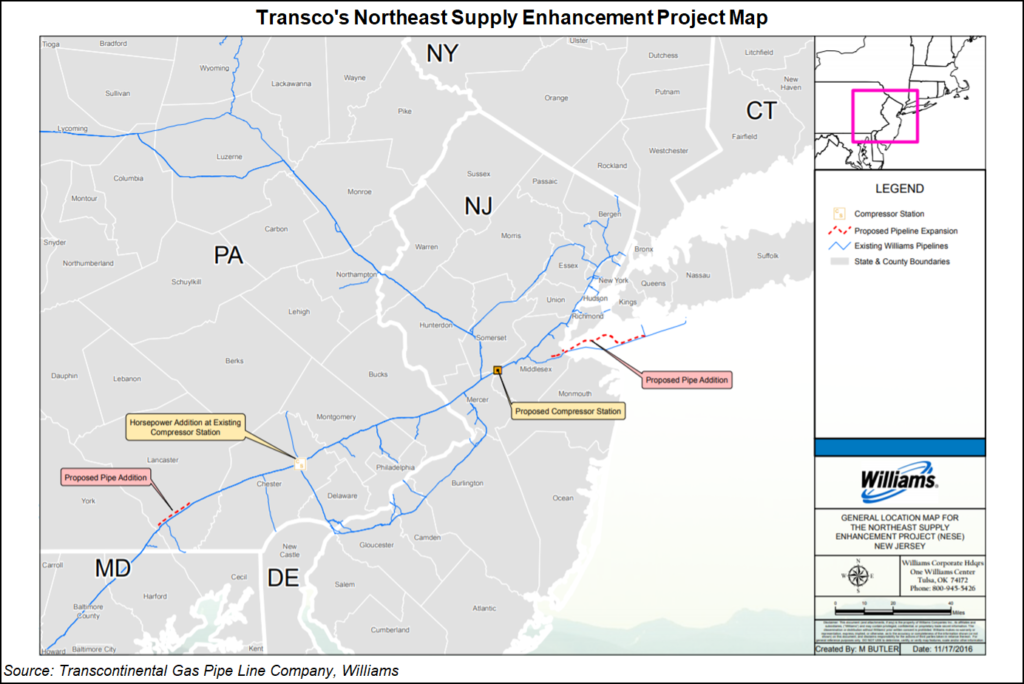Regulatory | Infrastructure | NGI All News Access | NGI The Weekly Gas Market Report
New York, New Jersey Again Reject Northeast Supply Enhancement Project
New York and New Jersey have again denied water quality permits for the Northeast Supply Enhancement (NESE) project, which would move more natural gas into New York City.

Regulators in both states issued their denials on Friday. The New York State Department of Environmental Conservation (DEC) denied NESE’s water quality certification (WQC). The agency, which denied the authorization for similar reasons in May 2019, said the project fails to meet water quality standards and would significantly impact the environment.
Part of NESE would cross the Raritan and New York bays, which raised the most concern among environmentalists and others opposed to the project. The DEC said construction would result in the re-suspension of sediments and other contaminants, including mercury and copper. The agency also said it would disturb sensitive habitats, including shellfish beds and other bottom-dwelling marine life.
“New York is not prepared to sacrifice the state’s water quality for a project that is not only environmentally harmful but also unnecessary to meet New York’s energy needs,” DEC said late Friday.
The New Jersey Department of Environmental Protection (DEP), which also denied key authorizations for the project last year, quickly followed New York’s decision and rejected Transcontinental Gas Pipe Line Co. LLC’s (Transco) application for a WQC, coastal wetland, flood hazard area and waterfront development permits. The DEP said that because New York denied the project a WQC there was no compelling need for the pipeline expansion.
Transco parent Williams said it was “disappointed” by the decisions, adding that it “remains committed to meeting the demand for a clean alternative to heating oil and diesel, and we are prepared to deliver reliable and affordable natural gas to meet the clean energy needs in the areas in which we operate.”
As New York continues to favor stronger climate goals it has declined to issue permits for a series of other natural gas pipeline projects, including the Constitution Pipeline, which was also partly sponsored by Williams. That project was scrapped altogether in February after years of regulatory and legal battles that began when the DEC rejectedits WQC in 2016.
NESE is fully subscribed by National Grid and has been billed as a way to fill natural gas supply shortages in the city and help reduce the use of dirtier fuels for energy needs there. But after facing strong resistance from the state and battling through a new service moratorium that the state ordered lifted last year, National Grid has been working on plans that don’t rely on new fossil fuel infrastructure. Other utilities serving the city, such as Consolidated Edison Co., have inked deals to expand other interstate systems.
More recently, New Jersey has taken a stronger stance against natural gas infrastructure projects as well, rejecting not only NESE’s authorizations, but taking other projects like the PennEast Pipeline to court.
“Small businesses and underserved communities are the ones who will be the most harmed by the decision to deny this permit,” said the Interstate Natural Gas Association of America. “Every blocked natural gas pipeline means higher energy bills for working families in New York and New Jersey. This decision was not about science or water quality. It was about politics.”
© 2024 Natural Gas Intelligence. All rights reserved.
ISSN © 1532-1231 | ISSN © 2577-9877 | ISSN © 1532-1266 |
